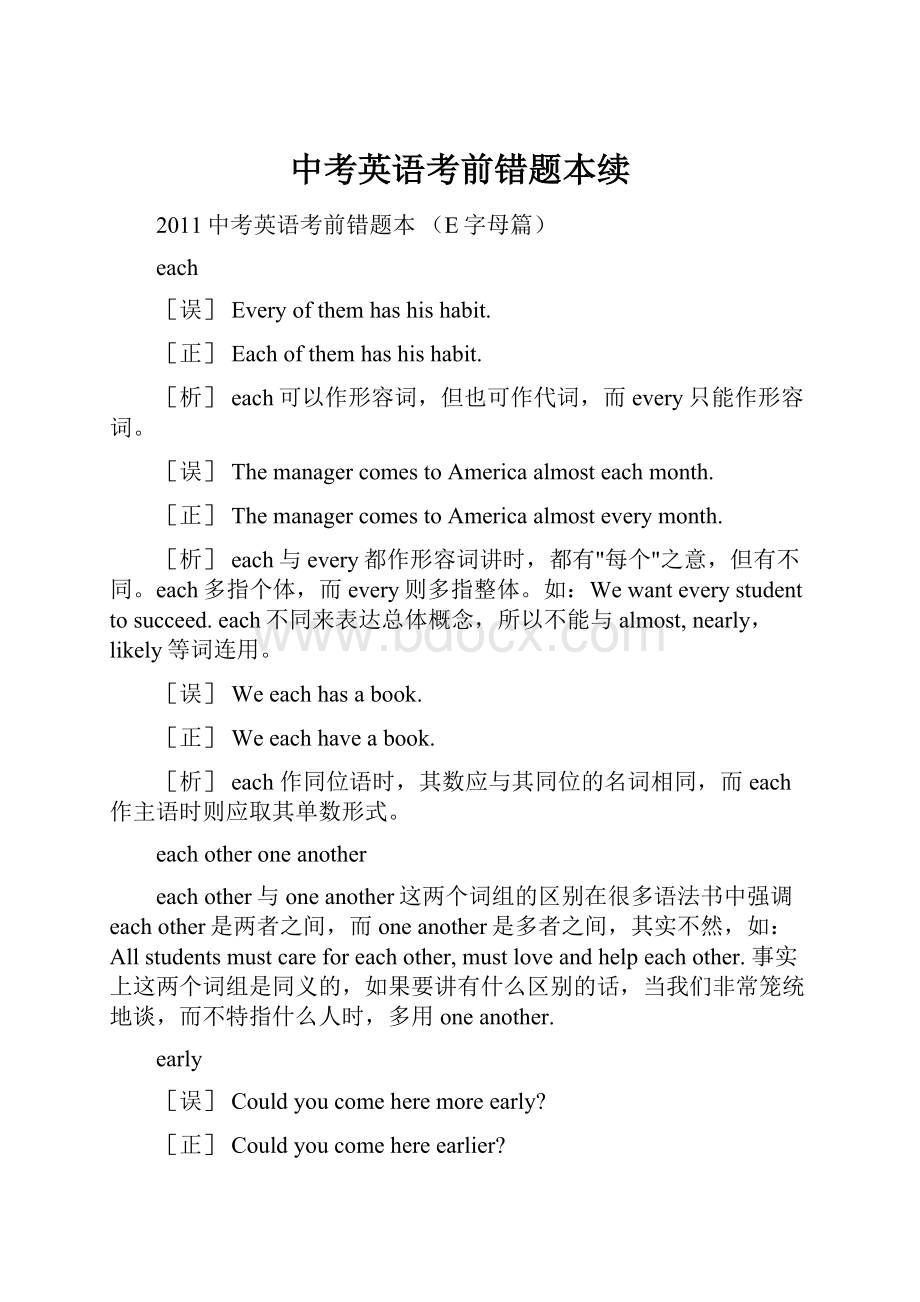中考英语考前错题本续.docx
《中考英语考前错题本续.docx》由会员分享,可在线阅读,更多相关《中考英语考前错题本续.docx(81页珍藏版)》请在冰豆网上搜索。

中考英语考前错题本续
2011中考英语考前错题本(E字母篇)
each
[误]Everyofthemhashishabit.
[正]Eachofthemhashishabit.
[析]each可以作形容词,但也可作代词,而every只能作形容词。
[误]ThemanagercomestoAmericaalmosteachmonth.
[正]ThemanagercomestoAmericaalmosteverymonth.
[析]each与every都作形容词讲时,都有"每个"之意,但有不同。
each多指个体,而every则多指整体。
如:
Wewanteverystudenttosucceed.each不同来表达总体概念,所以不能与almost,nearly,likely等词连用。
[误]Weeachhasabook.
[正]Weeachhaveabook.
[析]each作同位语时,其数应与其同位的名词相同,而each作主语时则应取其单数形式。
eachotheroneanother
eachother与oneanother这两个词组的区别在很多语法书中强调eachother是两者之间,而oneanother是多者之间,其实不然,如:
Allstudentsmustcareforeachother,mustloveandhelpeachother.事实上这两个词组是同义的,如果要讲有什么区别的话,当我们非常笼统地谈,而不特指什么人时,多用oneanother.
early
[误]Couldyoucomeheremoreearly?
[正]Couldyoucomehereearlier?
[析]单音节和少数双音节副词的比较级和最高级要用er和est来作其结尾,如fast,soon,early,hard,long,near等。
earth
[误]Whatontheearthdoyoumean?
[正]Whatonearthdoyoumean?
[析]onearth这一词组在句中为的是加强语气,其意为"究竟"、"到底"。
而作为"地球"讲时则要加定冠词,如:
Howfaristheearthfromthemoon.而作为"泥土"讲时则为不可数名词,如:
Hefilledthepotwithearthandwantedtoplantsomeflowers.
easy
[误]Youcaneasyimaginemysurprise.
[正]Youcaneasilyimaginemysurprise.
[析]easy只在有限的词组中被用作副词,如takeiteasy(不要紧张),goeasy,standeasy等。
例如:
Easycome,easygo.(钱来的容易花的也快.)Easiersaidthandone.(说的容易做着难。
)
east
[误]JapanisontheeastofChina.
[正]JapanistotheeastofChina.
[析]在讲述地理位置时,有3个介词常用,它们是in,on和to,其中in表示处于所表达的范围之内,如:
ShanghaiisintheeastofChina.on则表示双方接壤,如:
NorthKoreaisonthenortheastofChina.而表示互不相接的两部分时则用to,如:
TaiwanistotheeastofFujian.
either
[误]-Idon'tlikeopera.
-Idon'tliketoo.
[正]-Idon'tlikeopera.
-Idon'tlikeeither.
[析]在否定句中用either表示"也",而在肯定句中用too表示"也"。
[误]EitheryouorIareright.
[正]EitheryouorIamright.
[析]这在语法书中被称作就近原则,即哪个主语离谓语动词近,则应采用与哪个主语相一致的谓语动词,相同用法的还有neither…nor…,notonly…butalso…,以及or在连接两个主语时。
如:
Youorheistogohome.Theotherswillhavetostayintheclassroom.
elder
[误]MyolderbrotherhasgonetoShanghai.
[正]MyelderbrotherhasgonetoShanghai.
[析]在表示兄姐的长幼时应用elder表示"哥哥姐姐",如:
myeldersister姐姐,但表示岁数时则多用older,如:
SheistwoyearsolderthanI.
empty
[误]Aretheseseatsempty?
[正]Aretheseseatstaken?
[析]empty是指空洞的没有任何物体,如:
Thehousewasempty,其意思是没有任何家具或屋内无人。
但座位是否有人坐应用take.
English
[误]MysisterstudiedEnglishlanguageverywell.
[正]MysisterstudiedtheEnglishlanguageverywell.
[正]MysisterstudiedEnglishverywell.
[析]在泛指某一种学科时,不应加冠词,如:
Ilikehistory.但如特指某一门学科时则应加冠词,如:
HelikesthehistoryofAmerica.
enjoy
[误]Ienjoytoplayfootball.
[正]Ienjoyplayingfootball.
[析]enjoy后要接动名词,而不接不定式。
[误]DidyouenjoyattheEnglishevening?
[正]DidyouenjoyyourselfattheEnglishevening?
enough
[误]I'msorry.Youarenotstudyingenoughcarefully.
[正]I'msorry.Youarenotstudyingcarefullyenough.
[析]enough要用在形容词或副词之后。
[误]Doyouhaveenoughofmoney?
[正]Doyouhaveenoughmoney?
[正]Doyouhaveenoughofthemoney?
[误]Thecoffeeisn'tenough.
[正]Thereisn'tenoughcoffee.
[析]enough可以作be动词的表语,但其主语应是代词,如:
That'senough.Itwasenough.如果是名词时应换用上面的句型。
entrance
[误]Theentranceofthecinemaisonyourright.
[正]Theentrancetothecinemaisonyourright.
[析]在表示通往某处时entrance后面多用to作介词。
这样的用法还有keytothedoor,answertothequestion等。
evening
[误]Iwalkedhomeinacoldevening.
[正]Iwalkedhomeonacoldevening.
[析]intheevening这一词组如加上另外的修饰词则其介词应换为on.
everyone
[误]Everyoneofyougoestoclass.
[正]Everyoneofyougoestoclass.
[析]everyone其后不能接of结构。
在否定句中如果要讲"每一个人都没有注意到它",就译作:
Nobodynoticedit.要注意Everyoneofusisnotright.应译为"我们不都对。
"而Noneofusareright.才应译为"我们全错了。
"
exam
[误]Wetakepartinanexam.
[正]Wetakeanexam.
[析]takepartin为"参加"某种活动,运动,而在学科中选择某一学科学习并进行考试应用take.
except
[误]Theroomiscleanexcepttwodesks.
[正]Theroomiscleanexceptfortwodesks.
[误]IcomehereeverydayexceptforSunday.
[正]IcomehereeverydayexceptSunday.
[析]在同一类物体中排除某一部分用except,在不同类物体中排除某一物体时用exceptfor。
而exceptthat其后接从句,如:
Sheisagoodgirlexceptthatsheiscarelesssometimes.而besides则是"包括在内",如"我学习英语同时还学法语。
"应译为:
IstudyEnglishbesidesFrench.
exercise
[误]ThestudentsexercisespokenEnglishinthemorning.
[正]ThestudentspractisespokenEnglishinthemorning.
[析]exercise多指运动、训练,而practise则多指把理论付诸于实践的练习。
[误]Everyoneshoulddoexerciseseveryday.
[正]Everyoneshoulddoexerciseeveryday.
[析]作为运动讲exercise是不可数名词,而当"练习"、"体操"、"早操"则是可数名词,例如:
IdoalotexercisesintheP.E.class.
2011中考英语考前错题本(F字母篇)
fail
[误]Tomfailedhisexam.
[正]Tomfailedinhisexam.
[正]Tomfailedtopasstheexam.
[析]fail为不及物动词,其后可用in加名词,或直接接不定式。
family
[误]I'msorryIhavetogo.Tom'sfamiliesarewaitingforme.
[误]I'msorryIhavetogo.Tom'sfamilyiswaitingforme.
[正]I'msorryIhavetogo.Tom'sfamilyarewaitingforme.
[析]family是集合名词,把它当作整体看它是单数,如看作家庭中的每个成员则为复数。
如:
Yourfamilyareverykindtome.Myfamilyisverylarge.
far
[误]Myschoolistenmilesfarfromhere.
[正]Myschoolistenmilesawayfromhere.
[析]far一般不与实际距离连用。
[误]"Didyouwalkfar?
"
"Yes,Iwalkedfar."
[正]"Didyouwalkfar?
"
"Yes,Iwalkedalongway."
[析]一般肯定句中不用far单独作状语,而用alongway.far组成的常用词组有:
asfaras.①远至,一直到。
如:
Hewalkedasfarasthestation.②就……而言。
如:
Asfarashewasconcernedthesebookswereverygood.③只要。
如:
IcanhelpyouasfarasIcan.sofor到目前为止。
例:
Heisverywellsofar.
fartherfurther
far有两个比较级,即farther和further,其意思略有不同:
farther主要用于表示距离的远近,如:
MilanisfartherawaythanRome.而further则是指"进一步的",如:
Willweneedanyfurtherdiscussiononthismatter.
fast
[误]Afasttrainrunsfastly.
[正]Afasttrainrunsfast.
[析]fast其形容词与副词形式相同。
fastsoon
fast指行动本身的速度快,如:
Theforeignerspeakstoofast.而soon则多指两个动作之间间隔短,时间到来的迅速,如:
Shewillcomesoon.
feel
[误]Ifeelbadlyaboutmymistakes.
[正]Ifeelbadaboutmymistakes.
[析]感观动词如feel,smell等后面要接形容词而不是副词。
feelgood是指某人精神好,而feelwell是指人身体状况良好。
[误]Itrynottohurtherfeeling.
[正]Itrynottohurtherfeelings.
[析]feeling在作"感情"讲时要用复数,而作"感觉"讲则要用单数。
如:
Ihaveafeelingthatwewillwinthegame.
few
[误]Fewofthemisverygood.
[正]Fewofthemareverygood.
[析]few意为"几乎没有",但要用复数谓语动词。
如果讲有一些人应用afew,如:
Therewereonlyafewpeopleinthestreet.
[误]Therearelessfarmsthanthereusedtobe.
[正]Therearefewerfarmsthanthereusedtobe.
[析]few的比较级为fewer,其后接可数名词;而little的比较级为less,其后接不可数名词。
field
[误]Heisafamousscientistonthefieldofphysics.
[正]Heisafamousscientistinthefieldofphysics.
[析]inthefield是"在田野上"或是"在某一学科领域内",而onthefield则多指"在战场上"。
如:
Helosthislifeonthebattlefield.
fill
[误]Shefilledorangeintomyglass.
[正]Shefilledmyglasswithorange.
[析]表示要用某种物品装满某容器时要用fillwith词组,如:
Theboyranbackhomefilledwithjoy.
fillfull
fill是动词,但有及物与不及物两种用法,当表示"充满"之意时是不及物动词,应用fillwith,如:
Thelittlegirl'seyesfilledwithtears.而当表示"使……装满某物"时,是及物动词,如:
Hefilledhispocketwithbooks.而befilledwith应看作系表结构,如:
Theboy'smotherwasfilledwithanger.full是形容词,要用befullof这一词组,如:
Theboywasfullofjoy.
find
[误]Hehasfindedhislostbike.
[正]Hehasfoundhislostbike.
[析]find是不规则动词,其过去式和过去分词均是found。
但found一词又意为"建立",它是规则动词,其过去式及过去分词均为founded.
[误]Itisverydifficulttolookforasuitablejob.
[正]Itisverydifficulttofindasuitablejob.
[析]lookfor为"寻找",而find是找到。
寻找工作并不难,难的应是找到合适的工作。
findfindout
findout意为"找出、算出、发现",如:
Ihavefoundouthowtodoit.而find的主要侧重点在找到某物,如:
Ifindmybookunderthedesk.
finish
[误]Ifinishedtoreadthatbooklastnight.
[正]Ifinishedreadingthatbooklastnight.
[析]英文中有些动词其后只能用动名词作宾语而不能用不定式作宾语,这样的动词在中考范围内有两个,即finish和enjoy。
fire
[误]There'snosmokewithoutafire.
[正]There'snosmokewithoutfire.
[析]此句应译为中文"无风不起浪"。
fire作为物质名词"火"讲时为不可数名词,而作为"炉火"、"火灾"讲则是可数名词,如:
Therewasafireinthenextstreetlastmonth.如要讲"着火了"要用beonfire,如:
Thefactorywas
onfire.
[误]Themanfiredtous.
[正]Themanfiredatus.
[析]fire(on)at均指"向某目标开火",at用于较小目标,而on用于较大目标。
first
[误]IsthisyourfirstlyvisittoBeijing?
[正]IsthisyourfirstvisittoBeijing?
[析]除了在强调第一、第二、第三等场合中有时还可见firstly一词外,这个词已不多见,而均被first取代。
first还有"首先"、"首次"、"第一次"之意。
follow
[误]Ireceivedaletterwhichranasfollow.
[正]Ireceivedaletterwhichranasfollows.
[析]asfollows是惯用法,其意为"如下",不论在任何场合均要用follows.
[误]Asfollowsarehisarguments.
[正]Thefollowingarehisarguments.
[析]asfollows主要用于句尾,而thefollowing则用于句首。
food
[误]Toomuchsweetfood,suchascakes,chocolates,pastry…mayincreaseyourweight.
[正]Toomanyfoods,suchascakes,chocolates,pastry…mayincreaseyourweight.
[析]food泛指食物时为不可数名词,如:
Thereisnofoodforsupper.而指一种种食物时则用作可数名词。
foot
[误]Thereisafivefeetwidebridge.
[正]Thereisafivefootwidebridge.
[析]用连字符组成的形容词中所有名词均要用单数形式。
[误]Wewenttocollegeonfeet.
[正]Wewenttocollegeonfoot.
[析]by后面加接交通工具时,不应加任何冠词,不要用名词的复数形式。
如加了某些修饰词后,其前面的介词要作适当的改变,如:
Icametoschoolinhiscaryesterday.Igotoshoolonatrain.
for
[误]Iwantedtogotothepubforhavingadrink.
[正]Iwantedtogotothepubforadrink.
[正]Iwantedtogotothepubtohaveadrink.
[析]用for表示目的时,其后面只能接名词,而不要接动名词。
[误]Iwenttotheofficeforseeingtheheadmaster.
[正]Iwenttotheofficetoseetheheadmaster.
[析]用不定式来表示动作的目的。
[误]IwillleaveBeijingtoShanghai.
[正]IwillleaveBeijingforShanghai.
[正]IwillleaveforShanghai.
[析]leavefor为一固定搭配,不要改动。
[误]Iboughtabooktoyou.
[正]Iboughtabookforyo